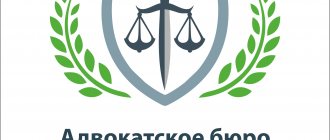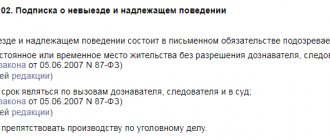The Russian criminal procedure law provides for several coercive measures that can be applied to suspects or accused persons. The most severe of them are detention and house arrest; their election is the exclusive competence of the court. The powers of the investigator or interrogating officer include the selection of other preventive measures, including a written undertaking not to leave the place and proper behavior. What restrictions are imposed on the citizen in this case? What can and cannot be done for a person under subscription, in what cases is it used? Read our article.
The concept of the term “undertaking not to leave”
Article 102 of the Code of Criminal Procedure of the Russian Federation understands this term as a criminal procedural measure of restraint applied during an investigation or trial against a suspect or accused.
By giving a written undertaking not to leave, a person agrees with the restriction of freedom of movement. Specific obligations include:
- Do not leave your place of residence without permission from the court or investigator. The signatory himself indicates the address of residence and is obliged to notify the investigator even about moves within the same locality.
- To appear when summoned by the investigator or the court at the specified time.
- Do not interfere with the proceedings of the case.
- Do not enter into contact with other participants in the criminal process, so as not to be accused of obstructing the investigation.
With the exception of these restrictions, a written undertaking not to leave the place allows you to lead a normal life, attending work and moving around the city.
Validity
Every movement of the suspect must be monitored by specialized authorities for a specified period. Usually the deadlines are indicated on the agenda itself when it is issued. The legislator determines possible options for the duration of punishment:
- until the court cancels the sanction;
- during the trial;
- during the preliminary investigation.
If the subscription serves as a means of restricting the freedom of a suspect, then, according to current legislation, the maximum period of its validity is 10 days. After this time, the ban ceases to apply.
However, in relation to the accused, the ban has a different duration - it is lifted only after the completion of the litigation. Only in this case can the ban be lifted by the court.
In what cases is this measure used?
A recognizance not to leave the place in criminal proceedings is used when:
- A citizen obstructs the investigation.
- It can destroy direct or indirect evidence.
- On his part, there is a risk of threat to the life and health of the participants in the case.
- The investigator fears that the accused will continue to commit crimes.
- There is a risk of the suspect fleeing the investigation.
A recognizance not to leave can only be applied to those who have committed a crime of minor and medium gravity, for which imprisonment is not provided.
Who is not subject to this restriction?
The law prohibits the issuance of a written undertaking not to leave the place of residence:
- In relation to suspects and accused of committing grave and especially grave crimes.
- For people who have to move around a lot due to their line of work (truck drivers, etc.).
- In relation to the military, since they cannot appear when summoned, due to the ban on leaving the military unit without the permission of the commander.
- Persons who do not have registration and who are in the city temporarily (on a business trip, on vacation, etc.).
- Diplomatic couriers.
- Witnesses. The recognizance order applies only to accused and suspects. An obligation to appear can be applied to witnesses based on Article 102 of the Code of Criminal Procedure of the Russian Federation.
When deciding to apply a recognizance not to leave, the investigator and the judge must evaluate all the circumstances of the case. If there are doubts about the signatory’s compliance with the requirements of this document, another preventive measure will be applied to him.
How to check if there is a ban on traveling abroad
From October 2022, the amount of outstanding debt for which a decision may be made to ban travel abroad has been increased to 30,000 rubles.
- For unpaid debt amounts, the relevant organization must sue the defaulter;
- After a court decision on debt collection is made, the case is sent to the FSSP (Federal Bailiff Service);
- The authorized bailiff informs the citizen in writing about the financial debt. 5 days are allotted for payment;
- Within 5 days, if the debtor does not take positive actions to resolve the issue, then the bailiff has the right to petition for a ban on such a citizen leaving Russia.
After receiving notification of payment of the debt, the bailiff immediately cancels the existing restriction on travel. But this information must also reach the border service and the Main Directorate for Migration Affairs of the Ministry of Internal Affairs, and this will take time. Therefore, there is a certain waiting period for the ban to be lifted.
Providing a receipt for payment to border guards does not make sense, since they are not authorized to make such decisions. Using your personal account created on the website of the Federal Tax Service, you can regulate a number of financial issues, including finding out about existing debts. All the indignation after the release of the law banning civil servants from traveling abroad subsided when, upon closer examination, it became clear that we were not talking about all civil service employees. Moreover, the proposed ban applies only to certain categories of citizens: Answered by the head of the point:
Hello The preventive measure can be changed to a more lenient one, including bail, for any crime (Article 106 of the Code of Criminal Procedure).
See advice 7846 on page
. 4.2015
The point manager answers:
Hello. The preventive measure may be changed by the court to detention or house arrest. 6.2016
Read other articles on the site:
- Correctional work has been replaced by imprisonment: how to fire an employee
- Theft, that is, the secret theft of someone else's property, hypothesis disposition
- Responsibility for the theft of electricity in the Russian Federation in 2022
- Termination of a criminal case against one of the accused due to reconciliation
- Characteristics of the crime of causing grievous bodily harm
Dear colleagues, I wish each of us to hold high the title of lawyer, unswervingly adhering to the principles of impartiality and objectivity!
Issuing algorithm
Article 101 of the Code of Criminal Procedure of the Russian Federation defines the following stages of issuing a recognizance not to leave:
- The investigator or the court makes a decision or ruling on the application of this measure.
- Drawing up a document. It indicates the crime committed and the grounds for issuing a recognizance not to leave.
- Announcement of the decision to the suspect (accused).
- Explanation of the terms of the document to the citizen signing it. If this has not been done, then the accused has the right to issue a waiver of his own recognizance.
- Explanation of the procedure for appealing a decision to apply a subscription.
- Signing the document. If it applies to a minor, then he must sign it in the presence of authorized bodies and parents.
If you refuse to sign this document, the investigator has the right to apply another preventive measure. Since recognizance not to leave is the mildest possible, the rest will have more restrictions.
Have a question for a lawyer? Ask now, call and get a free consultation from leading lawyers in your city. We will answer your questions quickly and try to help with your specific case.
Telephone in Moscow and the Moscow region: +7
Phone in St. Petersburg and Leningrad region: +7
Free hotline throughout Russia: 8 (800) 301-39-20
If you disagree with the assignment of a recognizance not to leave, the suspect may go to court to appeal the decision to assign it.
Consequences for violating the subscription
Article 110 of the Code of Criminal Procedure of the Russian Federation states that for violation of the requirements of a written undertaking not to leave, a preventive measure will be chosen in the form of house arrest or detention.
An appropriate resolution will be issued for this purpose. The term of arrest will be equal to the term of the undertaking not to leave (until the end of the investigative actions).
The subscription may be replaced by other measures if the investigator has suspicions about the possible disappearance of the suspect. But if he managed to disappear, then the citizen will be sent to the criminal investigation department and, upon capture, will be placed in custody. Naturally, this will affect the course of the investigation.
In the event of an unintentional violation of the undertaking not to leave the place, the culprit should immediately appear before the investigator with an explanation of the reasons for the violation.
What happens if you violate the preventive measure?
The procedure for executing punishment is fixed in the Code of Criminal Procedure of the Russian Federation. Violation of the assigned ban is fraught with consequences. If a violation does occur, i.e. a suspect or other participant in legal proceedings travels outside the city or the border of Russia, then upon return he is obliged to come to the inquiry authorities or to the prosecutor and confess everything. Otherwise, it will mean disobedience to the law and threaten serious problems. If a citizen goes into hiding, the statute of limitations is suspended.
If the suspect does not appear before law enforcement and does not confess to his actions, he faces criminal penalties.
Period of restriction of freedom of movement
The validity period of the recognizance not to leave is not indicated in the document itself, but when it is drawn up it is determined by the investigator, interrogating officer or judge. These authorized persons know how long this preventive measure is valid.
Three options are possible:
- Until the end of the preliminary investigation.
- During the investigation.
- Throughout the trial.
But if a recognizance not to leave the place is issued to the suspect, then it is valid for 10 days. After this period, he must either be released from the restrictions of his subscription, or charged with him and assigned a new recognizance not to leave the place or another preventive measure.
When canceling your subscription, you must obtain a resolution to lift the travel ban. It is issued by the official who assigned the subscription.
The period of validity of a recognizance not to leave the place issued to the accused ends only with the pronouncement of a court verdict in the case.
Election procedure
As soon as the investigator comes to the conclusion that it is advisable to apply a recognizance not to leave the place of residence to a particular person, he issues a resolution on this, which he files in the case file. Then a form is filled out, where the signature of the accused or suspect is required, such a document is also filed in the materials:
WARNING NOT TO GO AND PROPER CONDUCT (sample)
Ekaterinburg October 20, 2018
Y. Ivanov Ivan Ivanovich, born March 3, 1977, living at the address: Ekaterinburg, st. Ryabinina, 2, apt. 89, I give this signature to the investigator of the second department for the investigation of cases related to violations of the operation of transport, Lieutenant of Justice Morozov E.N. is that until the end of the preliminary investigation and trial in a criminal case accusing me of committing a crime under Part 3 of Art. 264 of the Criminal Code of the Russian Federation, I undertake not to travel outside the city of Yekaterinburg, not to change my permanent place of residence and registration on the street. Ryabinina, 2, apt. 89, Yekaterinburg, without the permission of the investigator or the court, to appear when summoned, and not to interfere with the proceedings in the above-mentioned criminal case.
I, Ivan Ivanovich Ivanov, was explained the responsibility for violating the undertaking not to leave the place and proper behavior in the form of a change to another preventive measure, including house arrest or detention.
Accused: Ivanov I.I., number, signature
The subscription was selected by the investigator of the second department for investigating cases related to violations of the operation of transport, Lieutenant of Justice Morozov E.N. – number, signature
A mandatory item in the subscription must be the validity period for the suspect or accused.
Typically, investigators indicate, as in our example, “until the end of the inquiry (preliminary investigation) and trial.” This means that throughout the entire investigation, during the period of examination of the case by the prosecutor (after drawing up the indictment or conclusion), as well as throughout the entire trial (no matter how long it lasts, taking into account the postponement of hearings), a person’s freedom of movement will be limited.
The chosen preventive measure will last until the court announces a verdict or decision based on the results of the consideration of the criminal case. The operative part of the judicial act must necessarily indicate the decision regarding the subscription. There may be three options:
- “…. the preventive measure in the form of a written undertaking not to leave the place and proper behavior, chosen for the convicted V.K. Petrov, shall be left until the entry into force of this sentence.” Such an order will take place when Petrov V.K. imposed a punishment not related to imprisonment - for example, probation, correctional labor, a fine, etc.
- “...the preventive measure chosen for A.V. Kovalev should be cancelled.” Absolute cancellation of the subscription will take place subject to the complete acquittal of the citizen or the cessation of prosecution against him on any of the grounds (under an amnesty, due to the expiration of the statute of limitations for prosecution, in connection with reconciliation, etc.).
- “….. elected Manshina V.S. change the recognizance not to leave the place to detention until the verdict enters into legal force.” In this case, the court sentenced Manshin, who was under signature, to imprisonment; in this regard, he will be immediately taken in handcuffs to the court's guard room, and then taken to a pre-trial detention center.
In the above situations, the court, in accordance with the Code of Criminal Procedure of the Russian Federation, exercises its powers depending on the final decision in the case.
Question: Is it possible to change the preventive measure before the verdict is announced?
Yes, if the person violates it.
Lawful violation of requirements
In real life, objective requirements may arise to travel outside the city while under subscription. In this case, the citizen must contact the investigator, inquiry officer or judge.
Along with a written request addressed to them, you must submit:
- Exact travel dates.
- Causes.
- Documentary evidence of necessity (medical certificates, etc.).
If the request is granted, after arriving at your destination, you must obtain a stamp of arrival from local law enforcement agencies.
An alternative to a written undertaking not to leave the place may be a petition from the suspect himself, in which he undertakes to personally appear before the investigator or judge upon request.
The obligation to appear in person allows citizens to travel both within the territory of the Russian Federation and outside the country.
Personal guarantee
A personal guarantee is a kind of travel ticket. A person who can be trusted takes responsibility for delivering the suspect on time and delivering the suspect when called to the investigator.
A guarantor is a person who, in case of violation of this word, is subject to liability in the form of a monetary penalty. The duration of the surety is set by law enforcement agencies or the court or until the charges against the citizen are dropped.
A responsible citizen is selected according to the following criteria:
- achieving full legal capacity;
- good reputation;
- permanent residence in the city or town in which the suspect is located;
- the ability to take responsibility for one’s own actions and those of the suspect;
- the ability to influence the actions and thoughts of the suspect.
The legislator does not close the list, since the prosecutor can put forward his own requirements for the guarantor. You can find out exactly what the requirements are by contacting the state prosecutor directly.
The subscription begins its effect from the moment the designated person signs it.
The responsible person has the right to refuse his duties. This must be done with good reason and following a certain sequence of actions:
- Contact the investigator with a request to remove him from the duties of a guarantor. At the same time, the reasons why a citizen refuses the obligations imposed on him must be objective not only, in the opinion of the guarantor, but also of law enforcement agencies.
- The citizen submits a petition in the form of a statement, in which he sets out in detail the essence of the petition, indicating the exact data relating to the case.
A sample application can be found on the Internet or at the law enforcement office.
It is important to raise the issue of changing or removing this penalty in a timely manner, otherwise the citizen will be punished by paying a fine for failure to comply with his duties.
The person who assigned it has the right to cancel the subscription. The cancellation of the decision must be documented and handed over to the suspect.
How to cancel a decision early?
The presence of motivated reasons is the basis for canceling the recognizance not to leave or changing it to another preventive measure. The decision on this is made by the prosecutor or the court.
A request for early termination of a recognizance not to leave will be granted if:
- The investigation proved the innocence of the accused.
- There is no need to constantly monitor it.
The resolution on this is drawn up in two copies. One is given to the citizen who was under subscription, and the second remains with the prosecutor.
This resolution must be stored, since not all services simultaneously receive information about the cancellation of the subscription. As a result, problems may arise when crossing the border if the citizen does not have a copy of the decision to lift the undertaking not to leave.
How are they not allowed to go abroad?
Everything is simple here - on the border. And your receipt of a visa does not give absolutely any guarantees, that is, the visa was issued to you by the state to which you are going on vacation, and our border guards will not let you out.
The situation could be dire. Tickets and hotel paid, or vouchers, you have arrived at the airport or the Russian border already looking forward to your upcoming vacation... and here our border control will turn you back. Whether you are a debtor or not, border guards check borders at all checkpoints using a common database.










